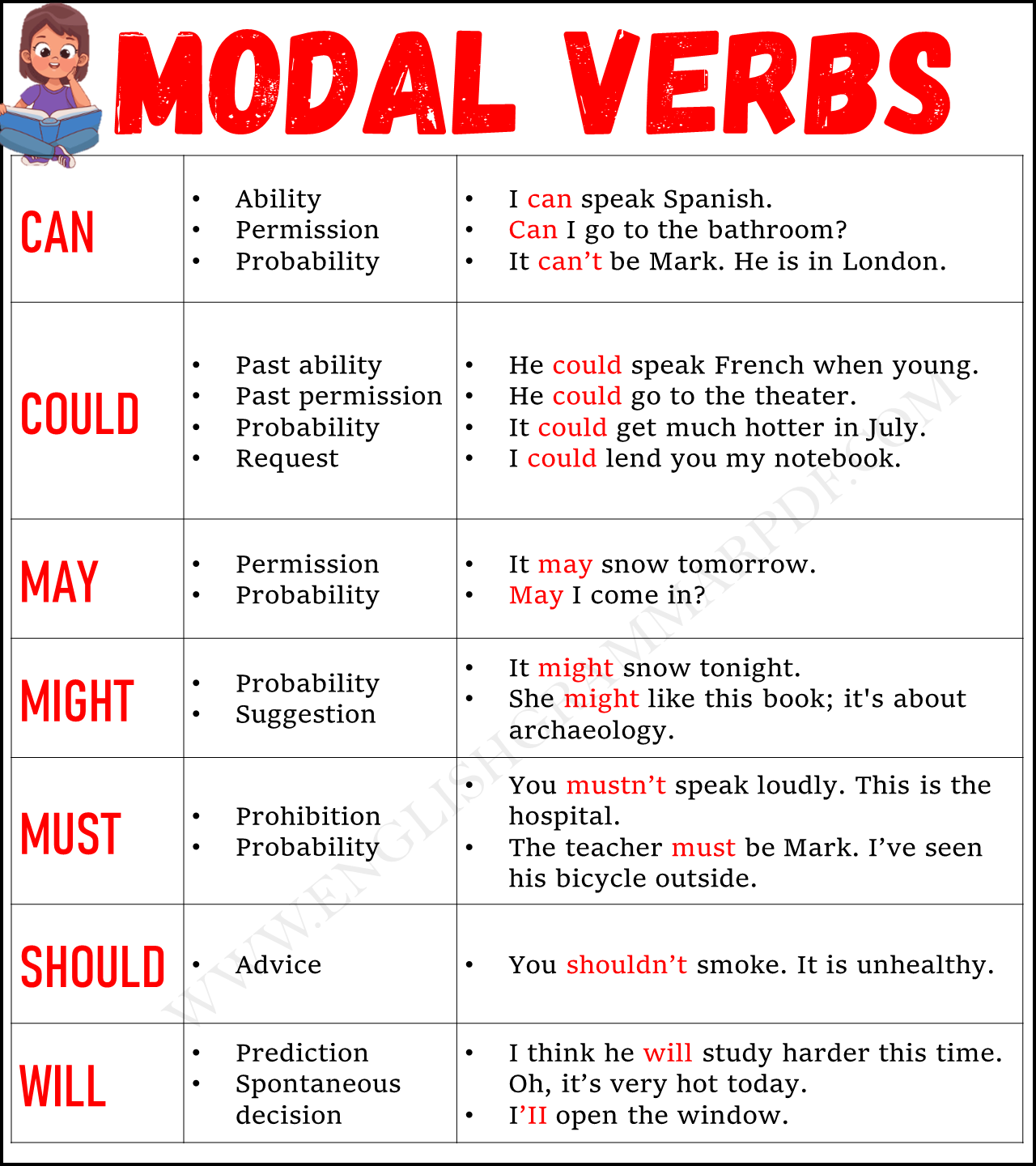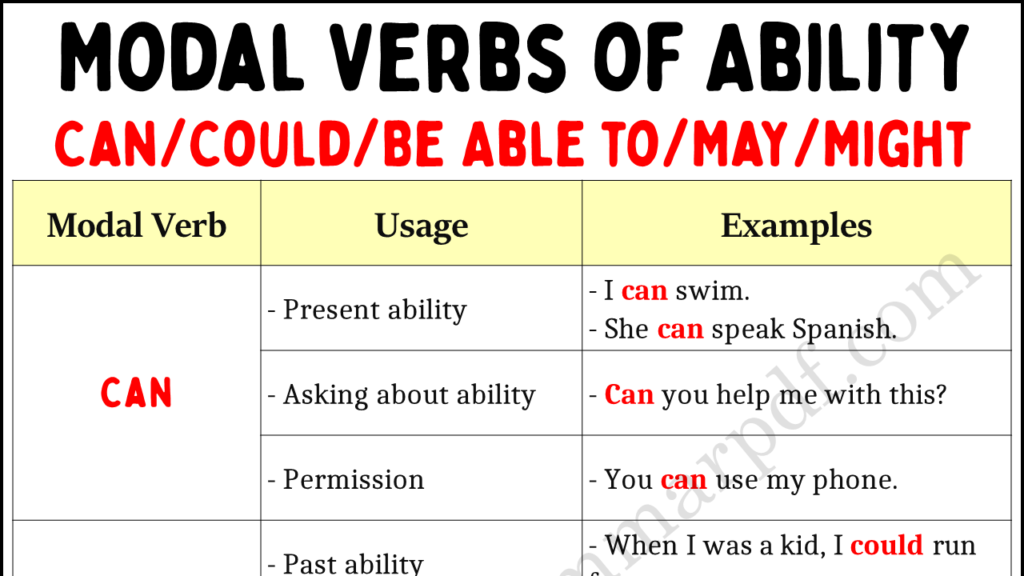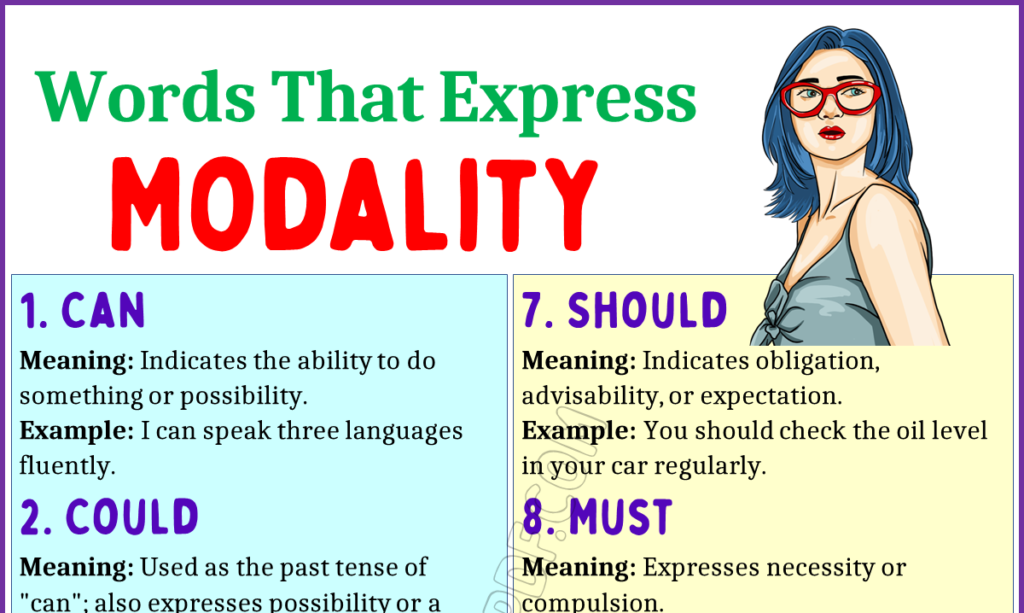Understanding modal verbs is like learning the secret codes of English. These special words, such as “can,” “must,” and “should,” help us talk about what we need, what we’re allowed to do, and what’s possible. They’re like helpers in our sentences, making our meaning clear. In this post, we’ll explore these handy verbs through simple explanations and examples, making it easy for anyone trying to learn or get better at English.
Understanding Modal Verbs
What are Modal Verbs?
Modal verbs are special verbs in English that add meaning to the main verb in a sentence. They help express things like ability, permission, obligation, or possibility. Common modal verbs include “can,” “could,” “may,” “might,” “must,” “shall,” “should,” “will,” and “would.” Unlike regular verbs, modal verbs do not change form according to the subject, and they are followed directly by the base form of the main verb without ‘to.’
For example, in the sentence “She can swim,” “can” is the modal verb showing ability, and “swim” is the main verb. Understanding these verbs is key to mastering English nuances.
Rules of Modal Verbs
Modal verbs play a significant role in English, and there are specific rules that govern their use. Here are some key rules to keep in mind:
- Base Form Usage: Modal verbs are always followed by the base form of the main verb, without ‘to’. For example, “She can dance” (not “She can to dance” or “She can dancing”).
- No Conjugation: Unlike other verbs, modal verbs do not change form for different subjects. For example, we say “I can” and “She can,” not “I cans” or “She cans.”
- No “-s” in Third Person Singular: Modal verbs do not take an “-s” in the third person singular form, which is common for regular verbs. For example, we say “He can read,” not “He cans read.”
- No Tenses: Modal verbs do not have past, present, or future forms. To express different times, other verbs or modal verb phrases are used. For example, “He will be able to go” for future ability instead of a future form of “can.”
- Negation: To make a modal verb negative, “not” is added after the modal verb. For example, “She cannot (can’t) swim.”
- Questions: To form a question, the modal verb is placed at the beginning of the sentence. For example, “Can you help me?”
- No Infinitive, Gerund, or Participle Forms: Modal verbs do not appear as infinitives (to can), gerunds (canning), or participles (canned).
- Semi-Modal Verbs: Some verbs, like “have to,” “ought to,” and “used to,” follow similar but not identical rules and are often called semi-modal verbs because they express modality but behave more like regular verbs in some respects.
Modal Verbs Usage and Examples
1. Can
- Ability: Expresses someone’s skill or capacity to do something.
- She can speak three languages fluently.
- My grandfather can still drive at 85.
- Possibility: Indicates something is possible.
- It can get very hot in Arizona during the summer.
- This strategy can save the company thousands of dollars.
- Permission: Asks for or gives permission.
- Can I leave early today?
- You can take one more cookie.
2. Could
- Past Ability: Ability in the past.
- When I was younger, I could run for miles.
- He could read when he was three.
- Polite Permission or Request: A polite way to ask for something.
- Could you pass the salt, please?
- Could I borrow your pen?
- Possibility: Something that might be possible or could have happened.
- If you hurried, you could catch the train.
- It could rain later according to the forecast.
3. May
- Permission: More formal permission than “can.”
- May I use your phone?
- You may enter now.
- Possibility: Something that might happen.
- There may be a strike next week.
- We may go to France for our holiday.
4. Might
- Possibility: Something that is less probable than “may.”
- It might snow tonight.
- They might come to the party if they’re in town.
- Suggestion: A gentle suggestion.
- You might want to check the engine before the long trip.
- She might like this book; it’s about archaeology.
5. Must
- Obligation/Necessity: Something that is necessary or very important.
- You must wear a helmet while riding a bike.
- She must take her medication every day.
- Strong Recommendation: Strongly advising something.
- You must see the new art exhibit; it’s fantastic.
- He must try the cheesecake; it’s the best.
6. Shall
- Formal Suggestion or Offer: Especially in British English, for suggestions or offers.
- Shall we dance?
- Shall I open the window?
- Future: Especially in legal or formal contexts to indicate future action.
- The company shall deliver the goods by Friday.
- The tenant shall pay the rent on time.
7. Should
- Advice: Recommending something.
- You should see a doctor about that cough.
- They should check the results again.
- Expectation: Expecting something to happen.
- The train should arrive by 5 PM.
- She should know the answer.
8. Will
- Future: Expressing future actions or occurrences.
- I will go to the grocery store tomorrow.
- The sun will rise at 6:30 AM.
- Willingness: Showing willingness to do something.
- I will help you with your homework.
- Will you please close the door?
- Promise: Making promises.
- I will always love you.
- We will never forget your kindness.
9. Would
- Polite Request: A polite way to ask for something.
- Would you mind closing the window?
- Would you like some coffee?
- Hypothetical Situations: Imagining situations.
- I would travel the world if I won the lottery.
- What would you do if you were invisible for a day?
- Past Habit: Something that was a habit in the past.
- When we were kids, we would play outside until dark.
- She would always call me on Sundays.



